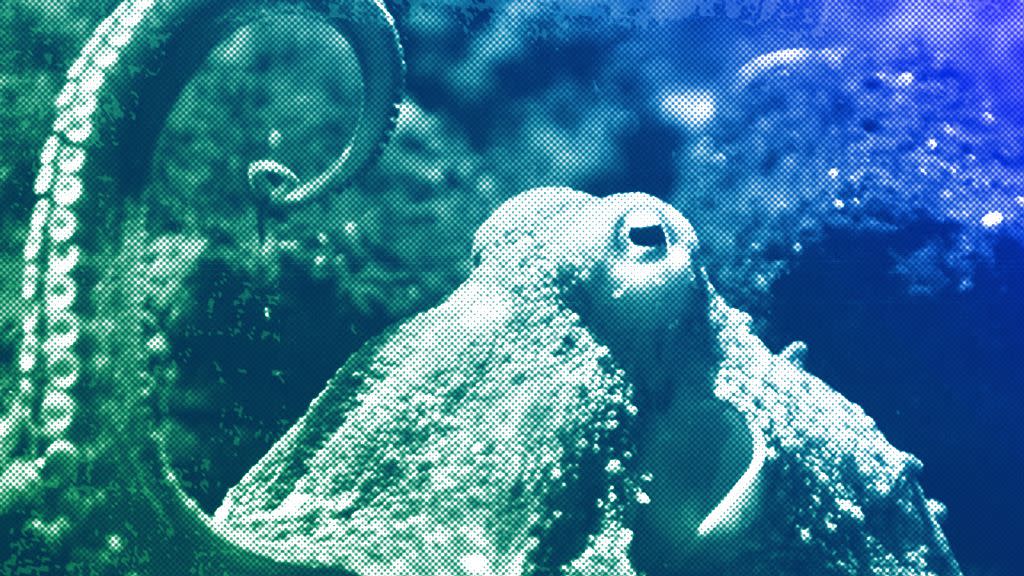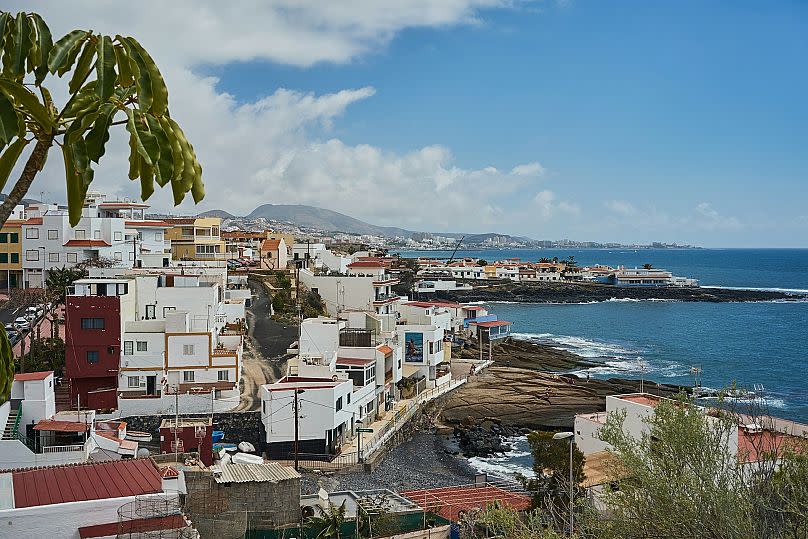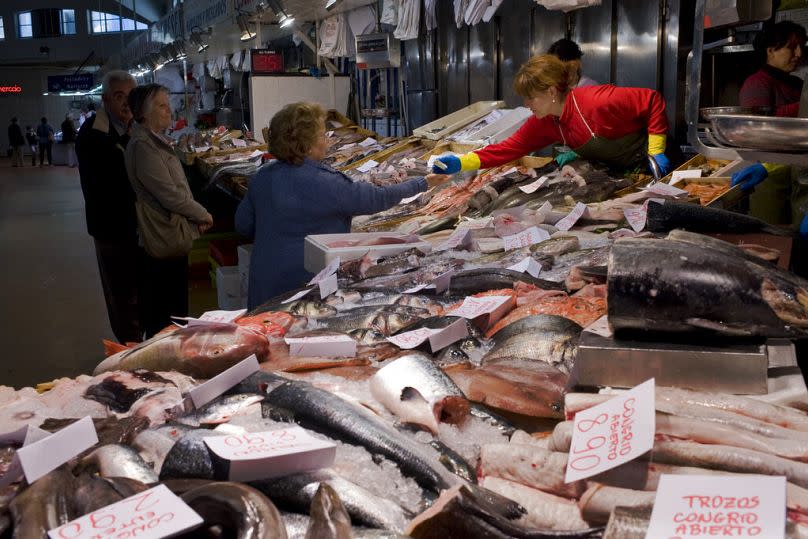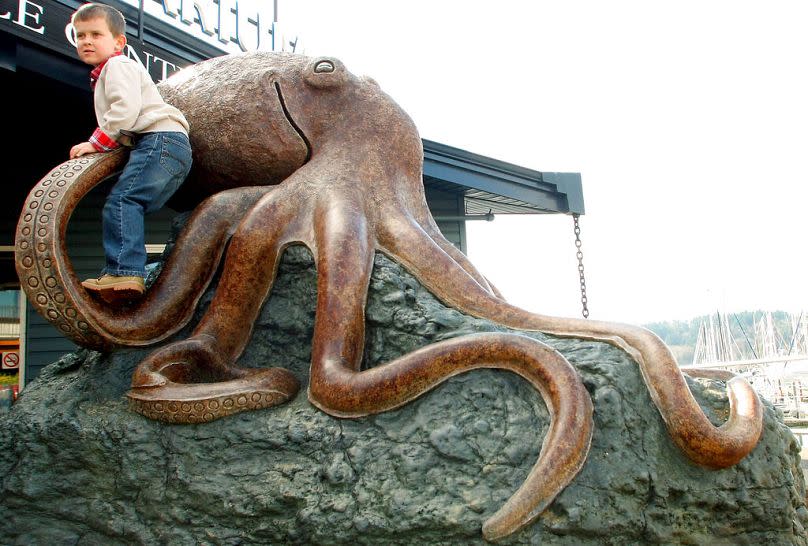Reckless and harsh octopus farming plans must be stopped

Demand for octopus as food has grown significantly in recent decades. Yet with concerns around overfishing restricting the number of wild octopuses caught, businesses have been researching how they can farm them.
Crucially, octopuses are naturally solitary animals who will inevitably suffer in farm conditions.
Confined in cramped indoor tanks of water, these intelligent, unique and sentient wild animals would cause them immense distress, causing aggression, and ultimately even cannibalism.
They are also carnivorous, meaning they need to be fed wild fish in captivity — an unsustainable practice that would put extra pressure on already overexploited fish populations.
So, when seafood company, Nueva Pescanova, announced plans to build the world’s first commercial octopus farm in Gran Canaria in Spain in 2019, it was rightly met with worldwide public outrage.
Last week, Compassion in World Farming — along with fellow NGOs Eurogroup for Animals and AnimaNaturalis — revealed that the company’s assessment of the environmental impacts of the farm it plans to build failed to consider the significant threats it would pose to wildlife, the environment and public health.
As a result, the Canary Islands Government rejected the assessment, highlighting a number of environmental and public concerns, and requested a far more detailed environmental assessment from the company.
It's not just about the octopuses
These concerns include threats to local wildlife — such as protected dolphins, whales and sea turtles — through noise and water pollution as the proposed site is close to a Marine Protected Area (MPA).
MPAs are areas of the ocean established to protect habitats, species and processes that are essential for healthy, functioning marine ecosystems so it is vital that these are respected.

There is a protected species of algae, Cystoseira sp., present in the surroundings. It plays a key role in marine conservation, supporting biodiversity, and food webs and sequestrating a large amount of carbon dioxide.
The government has raised concerns about pollution from the farm including CO2 emissions, odours and discharges that could significantly add to the already highly contaminated harbour waters at the site.
There are also concerns about the public health risks of the farm due to plans to use nearby seawater which is not clean enough to be used for human food production.
High energy use and public health risk
The proposed farm would also use large amounts of energy and water on an island already prone to droughts because it would operate with a land-based recirculation aquaculture system (RAS).
All of these concerns come at a time when we face a triple planetary crisis relating to climate change, pollution and biodiversity. Rather than contributing to these growing global problems, we should be finding ways to address them.
Ending factory farming and switching to regenerative farming practices is a big part of the solution.

Not only is factory farming the biggest cause of animal cruelty on the planet, it is damaging our planet through pollution, wildlife loss and emissions. We must act now before we eat our way to extinction.
On 8 October last year, or World Octopus Day, we coordinated a joint letter to the Canary Islands Government on behalf of 75 NGOs and experts calling on them to reject the octopus farm plans.
Octopuses punch when they are hungry and angry, study reveals
Octopuses have feelings and crabs should not be ‘boiled alive’, says new report
Just weeks ago, the US state of Washington passed the world’s first legislation to ban octopus farming. California and Hawaii are also introducing bills to ban this cruel and environmentally damaging practice.
Plans contradicting sustainability claims
Momentum is building around the world in opposition to octopus farming. Thousands of people have signed petitions, sent emails and taken part in social media actions to make their voices heard and stop the octopus farm.
Yet Nueva Pescanova continues to pursue plans to farm octopuses even though the project clearly contradicts its own corporate sustainability claims.

The company’s website claims that it is committed to "maintaining biodiversity", "protecting the ecosystem" and "promoting the circular economy". Yet establishing an octopus farm in Gran Canaria would be totally inconsistent with these statements.
That is why it's important to urge Nueva Pescanova to halt these reckless plans now, for the sake of octopuses, and our precious planet.
Octopuses become lovestruck after researchers give them ecstacy
Octopuses may go blind as climate change pulls oxygen from the ocean
Instead of finding new species to factory farm, we should be transforming our global food system to ensure we can produce healthy, affordable food in sustainable ways that benefit animals, people and our planet for generations to come.
Prioritising sustainability and compassion
In the face of a triple planetary crisis encompassing climate change, pollution, and biodiversity loss, the expansion of factory farming with new species like the octopus exacerbates these pressing issues.
This approach not only perpetuates documented inefficiencies but also poses dire threats to our environment, public health, and animal welfare.
Urgent action is needed to shift towards sustainable and ethical practices that prioritise the well-being of both people and animals, safeguarding our planet and securing a healthy food system for future generations.
Dr Elena Lara is Senior Research and Public Affairs Advisor (Aquatic Animals) at Compassion in World Farming.
At Euronews, we believe all views matter. Contact us at view@euronews.com to send pitches or submissions and be part of the conversation.

